
jetcityimage/iStock Editorial via Getty Images
Eli Lilly (NYSE:LLY) is reportedly looking to study its popular weight-loss drug Zepbound in people who aren’t considered overweight but are still at risk for developing conditions such as diabetes.
Lilly’s chief executive officer, Dave Ricks, told the Financial Times in an interview that the company was exploring testing Zepbound as a health maintenance therapy in people whose BMIs are below those considered overweight.
The FT noted that studies for Zepbound and Lilly’s anti-obesity drug candidate orforglipron have consisted of patients with a BMI of 30 and higher or patients with a BMI of 27 and higher who had other weight-related health issues.
Ricks told the FT that the company could be looking to lower the BMI number to 25 or lower for studies that would test the drug as a possible preventative medication for diabetes, stroke or vascular dementia. He added that lowering the BMI threshold may make sense for certain ethnic groups at higher risk of developing diabetes at lower BMI levels, such as Pacific Islanders.
Ricks added that the company still regards using Zepbound for cosmetic weight loss as “inappropriate.”
Zepbound, also known as tirzepatide, belongs to a class of drugs known as GLP-1s, which also includes Lilly’s diabetes drug Mounjaro. Tirzepatide’s biggest competitor in the GLP-1 market is Novo Nordisk’s (NVO) semaglutide, which is marketed under the names Ozempic and Wegovy.
Other companies with weight-loss drugs in development include Amgen (AMGN), Pfizer (PFE), AstraZeneca (AZN), Roche (OTCQX:RHHBY) Boehringer, Viking Therapeutics (VKTX), Altimmune (ALT), Zealand Pharma (OTCPK:ZLDPF)and Structure Therapeutics (GPCR).
